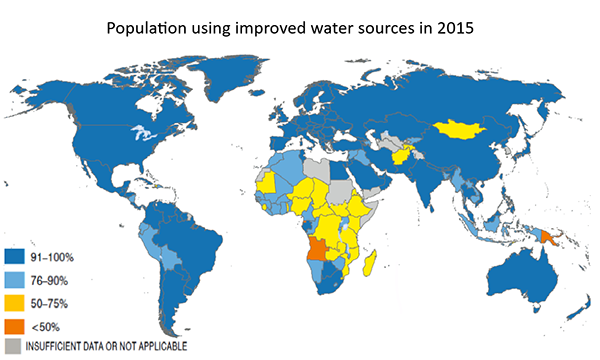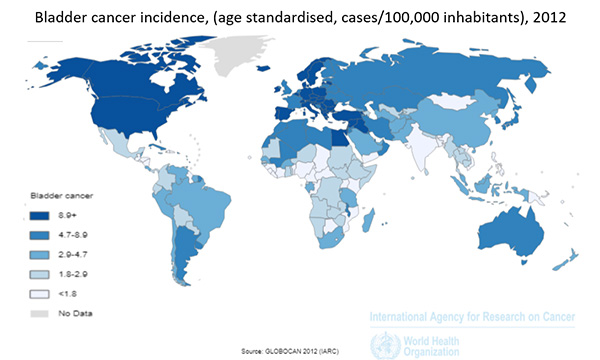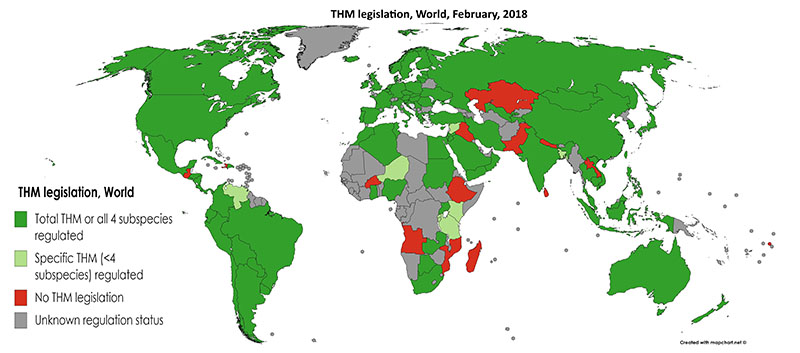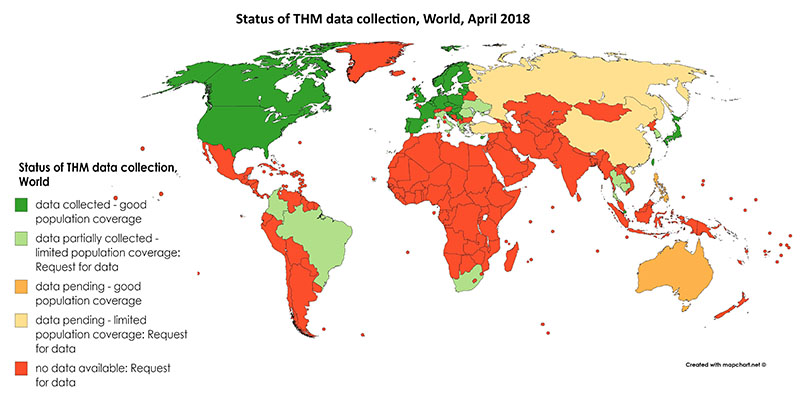Global Assessment of Trihalomethanes in Drinking Water

- Duración
- May 2017 - October 2018
- Coordinador
- Cristina Villanueva Belmonte (ISGlobal)
- Financiadores
- Human Genetics Foundation (Turin, Italy) and EC project EXPOSOMICS
Lack of access to improved drinking water sources is still a main problem in many parts of the world, leading to high incidence rates of waterborne infections or sanitation-related diseases.

Chlorination of drinking water is a major public health intervention to provide safe drinking water to the population and control for water-borne infectious diseases. On the other hand, disinfection process with chlorine generates undesired chemical by-products such as trihalomethanes (THMs). In some countries, this environmental exposure can be of concern since the whole population is exposed through ingestion, inhalation and dermal contact, and long-term exposure to THMs has been linked to disease, including bladder cancer.

THM levels in drinking water are regulated in many countries worldwide but are rarely reported in the majority of them and current levels at a global scale are unknown.

Specific objectives
- To develop a global map of current THM levels in drinking water (total and chloroform, bromoform, dibromochloromethane, bromodichloromethane)
- To estimate bladder cancer burden attributable to THM levels at a global scale
- To conduct a comparative risk assessment between bladder cancer attributable to THM levels and water-borne infectious diseases attributed to lack of improved drinking water sources.
In 2016, we conducted the same study for Europe and we are now expanding it to include non-European countries.
The project is led by Dr Cristina Villanueva together with Prof Manolis Kogevinas, Dr Susan Richardson (University of South Carolina) and Dr Stuart Krasner (Metropolitan Water District of Southern California) in the US and is coordinated by Dr Iro Evlampidou. Other close collaborators in the project are Weidong Qu (School of Public Health, Shanghai, China and David Reckhow (University of Massachusetts, US).
Expected impact
This project will provide for the first time a global assessment of current levels of THMs that, surprisingly, do not exist. THM exposure estimates will allow the development of disease risk assessment at a global scale.
Current status of the project
Data collection
Open Call for collaborators!
We are looking for collaborators in many countries in the world to provide THM data (total and chloroform, bromoform, dibromochloromethane, bromodichloromethane) (see map below).
Click the following links to see the study protocol and the questionnaire.
If you are interested please contact us at cristina.villanueva@isglobal.org

Acknowledgements
Many thanks to the people who have contributed data or helped us connect with the people who have the data we need!
Nuestro equipo
Coordinator
-
 Cristina Villanueva Associate Research Professor
Cristina Villanueva Associate Research Professor
ISGlobal Team
-
Emmanouil Kogevinas
-
 Zafeiroula Evlampidou Investigadora postdoctoral (colaboradora)
Zafeiroula Evlampidou Investigadora postdoctoral (colaboradora)
Otros proyectos
Ver proyectos pasadosMCC-Spain
Estudio multi-caso control poblacional, incluyendo tumores de alta incidencia en España
Proyecto INMA - Infancia y Medio Ambiente
HELIX
Novel tools for integrating early-life environmental exposures and child health across Europe
EGG/EAGLE
Early Genetics Growth/Early Genetics and Lifecourse Epidemiology
PACE
Pregnancy and Childhood Epigenetics
LIFECYCLE
Early-life stressors and LifeCycle health
OMEGA-NET
Network on the Coordination and Harmonisation of European Occupational Cohorts
BiSC (Barcelona Life Study Cohort)
HARMONIC
Health effects of cArdiac fluoRoscopy and mOdern radIotherapy in paediatriCs
Mobilise-D
Connecting digital mobility assessment to clinical outcomes for regulatory and clinical endorsement
EARLY-ADAPT
Signs of Early Adaptation to Climate Change
COVICAT
Cohorte Covid-19 en Cataluña
ATHLETE
Advancing Tools for Human Early Lifecourse Exposome Research and Translation
CONTENT
Cohorte de COVID-19 en España: dinámica social, salud mental y desigualdades
EUCAN-Connect
A federated FAIR platform enabling large-scale analysis of high-value cohort data connecting Europe and Canada in personalized health
OBERON
An integrative strategy of testing systems for identification of EDs related to metabolic disorders
EXPANSE
EXposome Powered tools for healthy living in urbAN SEttings
AURORA 2021
Actionable eUropean ROadmap for early-life health Risk Assessment of micro- and nanoplastics
ONES
Fine Particle Matter, Fetal Growth, and Neurodevelopment: Examining Critical Windows of Susceptibility
AIR-NB
Pre-natal exposure to urban AIR pollution and pre- and post-Natal Brain development
El impacto de la exposición al metaboloma de esteroides materno-fetales en el crecimiento infantil y los resultados neurológicos (IGRO)
Project Code: PI21/01269
NutinBrain
The role of seafood and nut consumption on human neurodevelopment from pregnancy to adolescence
ALTER - Contaminación del aire, microbiota intestinal y neurodesarrollo en los primeros 24 meses de vida
Project Code: PI21/01278
Alimentación S2: por una dieta saludable y sostenible
Estudio sobre la exposición a nano y microplásticos a través del agua de consumo de Barcelona
¿Es mejor consumir el agua de grifo si queremos reducir la exposición a nano/micropláticos?
UrbanKids
Urban and social environment and childhood obesity – a natural moving2health experiment
Laboratorio Ciudadano de Salud Urbana
Planificación urbana, medio ambiente y salud
Characterizing Oral Exposure to Nanoplastics and Microplastics
Characterization of Oral NMP Exposure
iGenCO
In-Depth Genomics and Cross-Omics Analysis for Undiagnosed Rare Diseases on a User-Friendly Collaborative Platform
5G expOsure, causaL effects, and rIsk perception through citizen engAgemenT
GOLIAT
CityExposomeCat
An Exposome Approach to Urban Health: Individualized Environmental Exposure Assessment in an Adults Population Cohort Study (GCAT)
TwinAir
Digital Twins Enabled Indoor Air Quality Management for Healthy Living
Subclinical Infections in Children and Long Term Health Effects
Infection acquisition in early life and health outcomes in childhood - MARATO TV3
UBDPOLICY
The Urban Burden of Disease Estimation for POLICY Making
Exposición prenatal a sustancias poli y perfluoradas en agua de consumo y neurodesarrollo en el inicio de la vida
Project Code: PI20/00829
Base genética materna y fetal de la función placentaria
Project Code: PI20/01116
TOLIFE
Combining Artificial Intelligence and smart sensing TOward better management and improved quality of LIFE in chronic obstructive pulmonary disease
BWater
Drinking Water in Barcelona: Sustainability and Health Impact Assessment
CUPID
INTERCAMBIO
Interventions to promote mental and physical health in changing working environments due to climate change, sustainable work practices, and in green jobs
intoDBP
Innovative Tools to Control Organic Matter and Disinfection Byproducts in Drinking Water
FINDOOR
FTIR spectroscopy for real-time detection of bacterial outbreaks and the rapid identification of pathogenic serotypes, relapsing infections and antibiotic resistance
OccRF-Health
Occupational exposure to radiofrequency electromagnetic fields: From exposure assessment to study of health in workers and their offspring
EPHOR
Exposome Project for Health and Occupational Research
EXPONIT
Analysing and studying how night shift work affects workers' circadian rhythms and health




